lesson12
- 格式:doc
- 大小:28.00 KB
- 文档页数:4
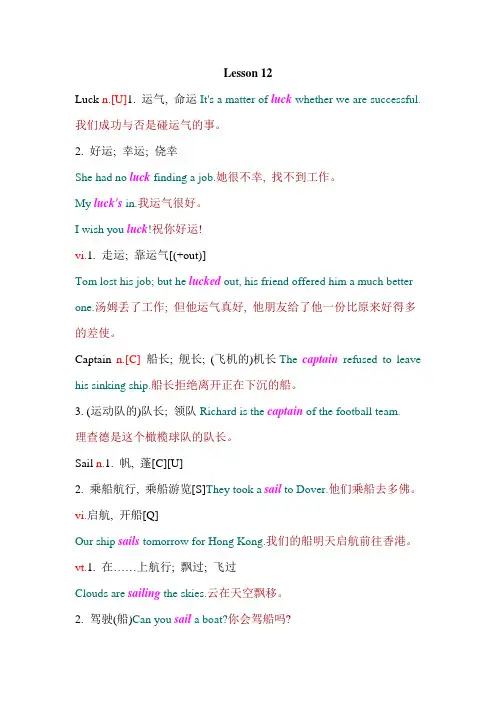
Lesson 12Luck n.[U]1. 运气, 命运It's a matter of luck whether we are successful.我们成功与否是碰运气的事。
2. 好运; 幸运; 侥幸She had no luck finding a job.她很不幸, 找不到工作。
My luck's in.我运气很好。
I wish you luck!祝你好运!vi.1. 走运; 靠运气[(+out)]Tom lost his job; but he lucked out, his friend offered him a much better one.汤姆丢了工作; 但他运气真好, 他朋友给了他一份比原来好得多的差使。
Captain n.[C]船长; 舰长; (飞机的)机长The captain refused to leave his sinking ship.船长拒绝离开正在下沉的船。
3. (运动队的)队长; 领队Richard is the captain of the football team.理查德是这个橄榄球队的队长。
Sail n.1. 帆, 蓬[C][U]2. 乘船航行, 乘船游览[S]They took a sail to Dover.他们乘船去多佛。
vi.启航, 开船[Q]Our ship sails tomorrow for Hong Kong.我们的船明天启航前往香港。
vt.1. 在……上航行; 飘过; 飞过Clouds are sailing the skies.云在天空飘移。
2. 驾驶(船)Can you sail a boat?你会驾船吗?sail through1. 顺利地通过She absolutely sailed through her exams.她绝对轻松地通过了考试。
set sail1. 开航The ship will set sail for London at once.船马上要启航去伦敦了。
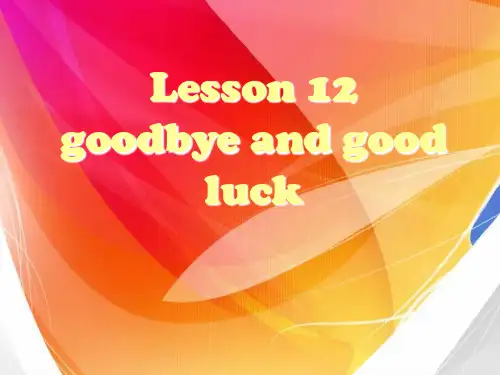
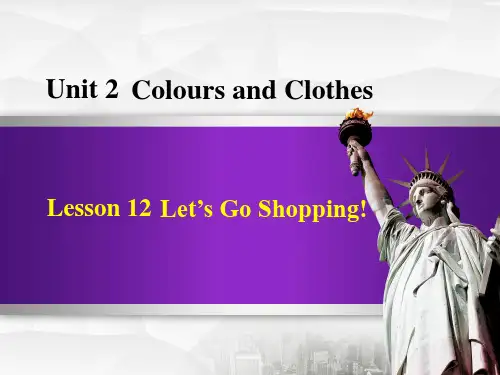
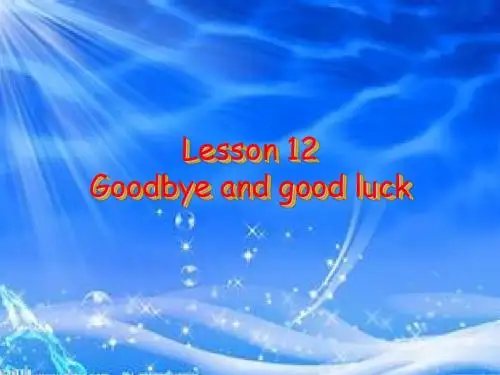
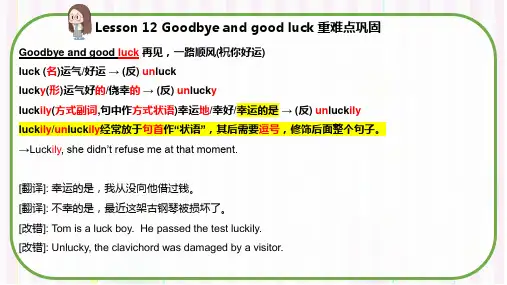
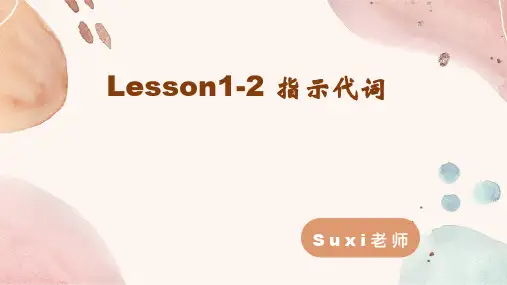
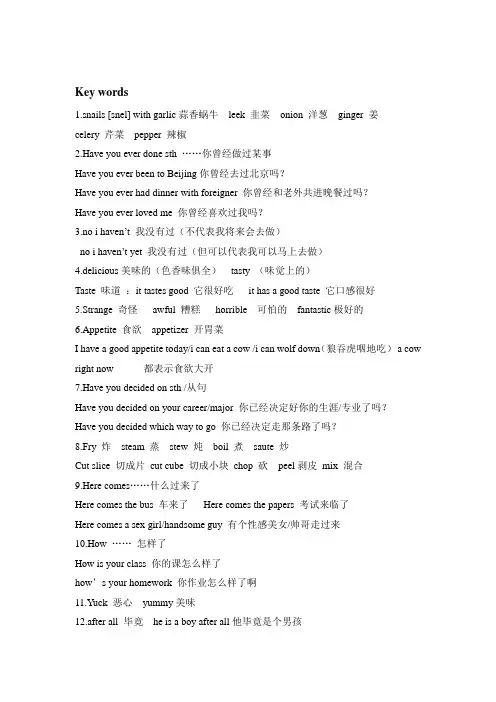
Key words1.snails [snel] with garlic蒜香蜗牛leek 韭菜onion 洋葱ginger 姜celery 芹菜pepper 辣椒2.Have you ever done sth ……你曾经做过某事Have you ever been to Beijing你曾经去过北京吗?Have you ever had dinner with foreigner 你曾经和老外共进晚餐过吗?Have you ever loved me 你曾经喜欢过我吗?3.no i haven’t 我没有过(不代表我将来会去做)no i haven’t yet 我没有过(但可以代表我可以马上去做)4.delicious美味的(色香味俱全)tasty (味觉上的)Taste 味道:it tastes good 它很好吃it has a good taste 它口感很好5.Strange 奇怪awful 糟糕horrible 可怕的fantastic极好的6.Appetite 食欲appetizer 开胃菜I have a good appetite today/i can eat a cow /i can wolf down(狼吞虎咽地吃)a cow right now 都表示食欲大开7.Have you decided on sth /从句Have you decided on your career/major 你已经决定好你的生涯/专业了吗?Have you decided which way to go 你已经决定走那条路了吗?8.Fry 炸steam 蒸stew 炖boil 煮saute 炒Cut slice 切成片cut cube 切成小块chop 砍peel剥皮mix 混合9.Here comes……什么过来了Here comes the bus 车来了Here comes the papers 考试来临了Here comes a sex girl/handsome guy 有个性感美女/帅哥走过来10.How ……怎样了How is your class 你的课怎么样了how’s your homework 你作业怎么样了啊11.Yuck 恶心yummy美味12.after all 毕竟he is a boy after all他毕竟是个男孩Tomorrow is another day after all 毕竟明天又是新的一天13.I really don’t care for ……我真的不喜欢……I really don’t care for the color /the kind of hairstyle/food 我真的不喜欢这个颜色/这类发型/食物14.instead of (用……)而不用……15.Hamburger 汉堡包(有火腿)beefburger德式牛排16.Rare 三分熟medium 五分熟well done 全熟Medium rare 三分到五分熟之间,可以为四分熟17.small 小的medium中等的large 大的18.Soda 苏打Text:A: Hey, this sounds good —snails with garlic! Have you ever eaten snails?B: No, I haven’tA: Oh, they’re delicious! I had them last time. Like to try some?B: No, thanks. They sound strange.C: Have you decided on an appetizer yet?A: Yes. I’ll have the snails, please.C: And you, sir?B: I think I’ll have the fried brains.A: Fried brains? Now that really sounds strange!A: Oh, good. Here comes the waitress now!C: Here are your snails, madam. And for you, sir…the fried brains.B: Thank you.A: Mmmm, these snails are delicious! How are the brains?B: Well, I think they’re… yuck! Oh, sorry, I guess brains are pretty strange after all. Um, I think I’m going to order something else, if you don’t mind.A: Oh, sure. Go ahead.B: Miss! Excuse me, miss!C: Yes?B: Uh, I really don’t care for this appetizer. Could you bring me something else?C: Yes, of course. What would you like instead?A: Try the snails.B: No, I don’t think so. I’ll tell you what. Just forget an appetizer for me, and bring me a nice, juicy hamburger… medium rare…with French fries and a large soda.。
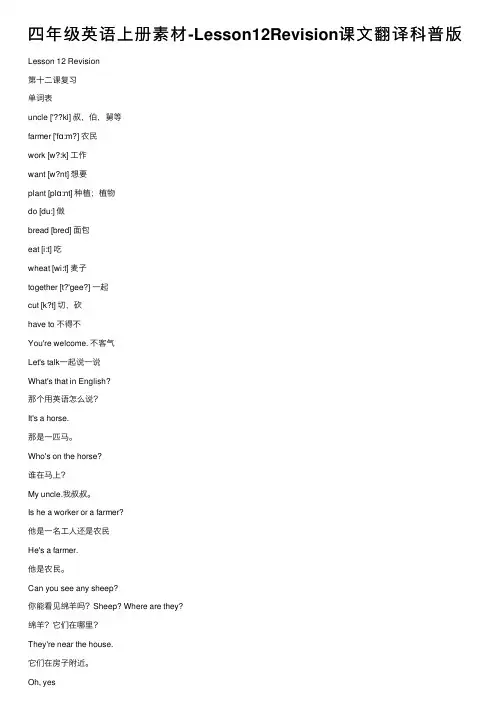
四年级英语上册素材-Lesson12Revision课⽂翻译科普版Lesson 12 Revision第⼗⼆课复习单词表uncle ['??kl] 叔,伯,舅等farmer ['fɑ:m?] 农民work [w?:k] ⼯作want [w?nt] 想要plant [plɑ:nt] 种植;植物do [du:] 做bread [bred] ⾯包eat [i:t] 吃wheat [wi:t] 麦⼦together [t?'gee?] ⼀起cut [k?t] 切,砍have to 不得不You're welcome. 不客⽓Let's talk⼀起说⼀说What's that in English?那个⽤英语怎么说?It's a horse.那是⼀匹马。
Who's on the horse?谁在马上?My uncle.我叔叔。
Is he a worker or a farmer?他是⼀名⼯⼈还是农民He's a farmer.他是农民。
Can you see any sheep?你能看见绵⽺吗?Sheep? Where are they?绵⽺?它们在哪⾥?They're near the house.它们在房⼦附近。
Oh, yes.哦,是的。
How many sheep can you see?你能看见⼏只绵⽺I can see fifteen.我能看见⼗五只。
What's the time, please?请问⼏点了?It's twelve o'clock.⼗⼆点钟了。
I have to go now. Goodbye.我现在得⾛了。
再见Bye-bye.再见。
Read and act读⼀读并表演The red hen.红母鸡I'm a red hen. I like to work.我是只红母鸡。
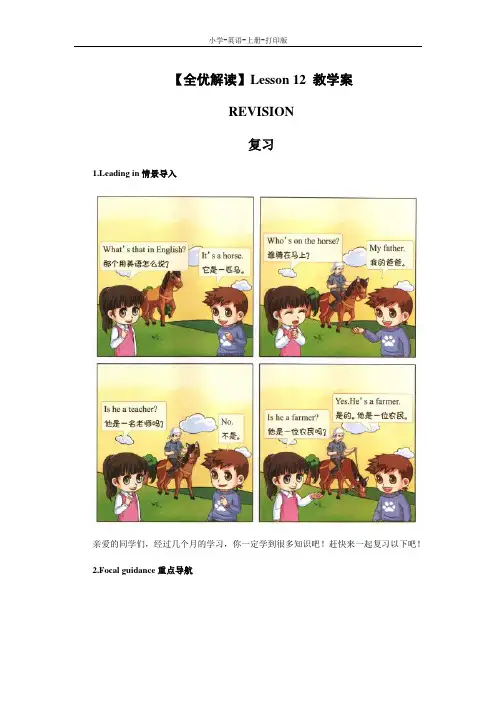
【全优解读】Lesson 12 教学案REVISION复习1.Leading in情景导入亲爱的同学们,经过几个月的学习,你一定学到很多知识吧!赶快来一起复习以下吧!2.Focal guidance重点导航3.Let'S talk谈一谈(Q=Qiqi, E=Eve)Q: What's that in English? 那个用英语怎么说?E:It's a horse.它是一匹马。
Q: Who's on the horse?谁骑在马上?E:My uncle.我的叔叔。
Q: Is he a worker or a farmer?他是一位工人还是一位农民?E:He's a farmer.他是一位农民。
E:Can you see any sheep?你能看到一些绵羊吗?Q: Sheep?Where are they?绵羊?它们在哪儿?E: They' re near the house.它们在房子附近。
Q: Oh, yes.哦,是的。
E: How many sheep can you see? 你能看到多少只绵羊?Q:I can see fifteen.我能看到15只。
E: What's the time, please?请问几点了?Q:It's twelve o'clock.12点钟。
E:I have to go now.0 Goodbye.我现在不得不走了。
再见。
Q: Bye-bye.再见。
Uncle/'ʌŋkl/叔,伯,舅等对应词:aunt姑,姨,舅母等短语:my uncle我的叔叔uncle Wang王叔叔uncle John约翰叔叔例句:My uncle is a teacher.我的叔叔是一名老师。
farmer/’fa:mə/农民复数:farmers短语:a farmer -位农民例句:My father is a farmer.我的爸爸是一位农民。
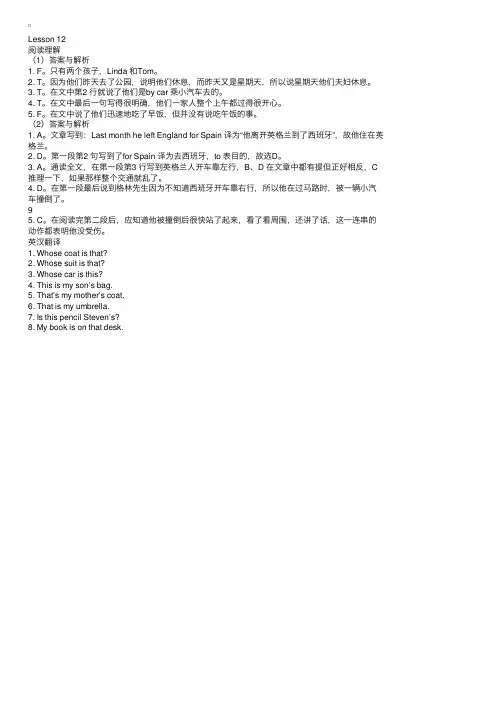
Lesson 12阅读理解(1)答案与解析1. F。
只有两个孩⼦,Linda 和Tom。
2. T。
因为他们昨天去了公园,说明他们休息,⽽昨天⼜是星期天,所以说星期天他们夫妇休息。
3. T。
在⽂中第2 ⾏就说了他们是by car 乘⼩汽车去的。
4. T。
在⽂中最后⼀句写得很明确,他们⼀家⼈整个上午都过得很开⼼。
5. F。
在⽂中说了他们迅速地吃了早饭,但并没有说吃午饭的事。
(2)答案与解析1. A。
⽂章写到:Last month he left England for Spain 译为“他离开英格兰到了西班⽛”,故他住在英格兰。
2. D。
第⼀段第2 句写到了for Spain 译为去西班⽛,to 表⽬的,故选D。
3. A。
通读全⽂,在第⼀段第3 ⾏写到英格兰⼈开车靠左⾏,B、D 在⽂章中都有提但正好相反,C 推理⼀下,如果那样整个交通就乱了。
4. D。
在第⼀段最后说到格林先⽣因为不知道西班⽛开车靠右⾏,所以他在过马路时,被⼀辆⼩汽车撞倒了。
95. C。
在阅读完第⼆段后,应知道他被撞倒后很快站了起来,看了看周围,还讲了话,这⼀连串的动作都表明他没受伤。
英汉翻译1. Whose coat is that?2. Whose suit is that?3. Whose car is this?4. This is my son’s bag.5. That’s my mother’s coat.6. That is my umbrella.7. Is this pencil Steven’s?8. My book is on that desk.。
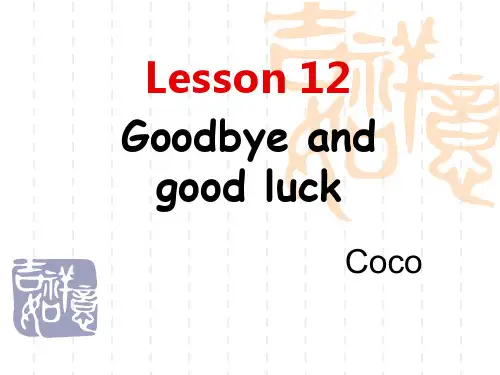
新概念第二册Lesson 12 Goodbye and good luck 一、单词精讲luck /lʌk/【释义】n.运气,幸运【例句】:I had the luckto find him.我有幸找到了他。
【搭配】by luck 侥幸地good luck 祝好运【联想】luck→lucky adj.幸运的→luckily adv. 幸运地lucky dog 幸运儿lucky day 幸运日luckily adv. 幸运地unlucky adj. 不幸的bless you 保重(比如在别人打喷嚏时说的话)【辨析】luck,chance,fortune1.luck 指机遇,命运,运气。
eg. Good luck plays an important role in his success.好运气在他的成功中起着重要的作用。
2.chance指偶然,碰巧,意外。
eg. I met my old friend by chance in the supermarket.我在超市偶然遇见了我的老朋友。
3.fortune尤指影响人生的机会,运气。
eg. His family's fortune changed completely after he won the lottery.在他中彩票之后,他家庭的运气完全改变了。
captain /'kæptən/【联想】captain→capital n.资本;首都,省会【例句】The man in charge ofa ship is called a captain.负责船上事务的人被称为船长。
【释义】①陆军上尉,海军上校【例句】The captain led his soldiers bravely in the battle.这位陆军上尉在战斗中勇敢地率领他的士兵。
【释义】①(足球队等)队长【例句】The captain of the football team encouraged his teammates before the game.足球队队长在比赛前鼓励他的队友。
《Lesson 12》学历案一、学习主题本课的学习主题是关于具体学科中的具体知识点或技能。
二、学习目标1、知识与技能目标学生能够理解和掌握核心概念 1的定义、特点和应用。
能够熟练运用相关公式或法则解决具体类型的问题。
学会实验操作步骤或技能要点,并能准确描述实验现象和得出结论。
2、过程与方法目标通过具体的学习活动,如小组讨论、案例分析等,培养学生的合作能力、分析问题和解决问题的能力。
引导学生经历知识的探究过程或思维过程,提高学生的自主学习能力和逻辑思维能力。
3、情感态度与价值观目标激发学生对学科内容的兴趣,培养学生的学习热情和积极的学习态度。
让学生在学习过程中体会到学科的价值或意义,增强学生的学科认同感和社会责任感。
三、学习重难点1、学习重点重点知识或技能 1的理解和应用。
重点知识或技能 2的掌握和实践。
2、学习难点对难点概念或问题的深入理解和突破。
解决复杂问题或综合应用时的思路和方法。
四、学习资源1、教材:教材名称及版本。
2、在线资源:相关网站或在线学习平台的链接。
3、实验器材:实验所需的器材名称和数量。
五、学习过程(一)课前预习1、阅读教材第X页至第X页的内容,了解本节课的基本概念和知识点。
2、完成预习作业:思考问题:提出几个与预习内容相关的问题,引导学生思考练习题目:布置几道简单的练习题,检验学生对预习内容的掌握程度(二)课堂导入1、通过具体的导入方式,如展示图片、播放视频、讲述故事等,引起学生的兴趣,引出本节课的学习主题。
2、提出问题:与导入内容相关的问题,激发学生的好奇心和求知欲(三)知识讲解1、结合实例,详细讲解核心概念 1的定义、特点和应用。
举例说明:列举生活中或学科中的实际例子,帮助学生理解概念对比分析:将相关概念进行对比,突出其异同点,加深学生的理解2、演示实验操作步骤或技能要点,让学生观察实验现象,引导学生分析和总结实验结论。
实验步骤:详细描述实验的操作流程注意事项:强调实验过程中的安全问题和关键要点3、运用多媒体教学手段,展示相关的图表、动画或视频,帮助学生直观地理解抽象的知识。
Lesson 12Section One单词讲解:Whistle 吹口哨essay 论文rucksack 帆布背包character 角色,性格,文字design 设计strap 带子lipstick 口红personally 个人的practically=actually 实际上pot 锅Dialogue1—Do you think you could stop whistling? I'm trying to write an essay.—Oh, I'm sorry. I thought you were in the other room.Q1BDialogue2—Is it alright if I leave my rucksack on the back seat?—Yes, of course. Go ahead.—And would you mind if I took off my shoes? My feet are killing me. —Well, I'd rather you didn't. It's a rather hot day.Q1 ADialogue3—Hello, Charles, I haven't seen you all day. What have you been doing? —Actually I've been working on my first novel.—Oh, yes. How far have you got with it?—Well, I thought of a good title, and I made a list of characters, and I've designed the front cover.—Have you started writing it yet?—Oh, yes. I've written two pages already.—Only two?—Well, yes. I haven't quite decided yet what happens next.Q1CDialogue4—I saw an accident yesterday.—What were you doing at the time?—I was queuing for the cinema.—And what did you do when you saw the accident?—I rushed forward to see if I could help.Dialogue5—Hmm. You are a good squash player. How long have you been playing? —I have been playing since the beginning of the last term. What about you? —Me? Oh, I've been playing about two years now. But I'm still not very good. Q1CDialogue6—I've got a watch with a silver strap.—That's nothing. I've got one with a gold strap.—I've got a watch that tells you the date.—That's nothing. I've got one that tells you the date and the day.Q1CRestaurant EnglishDialogue1Woman: Look at these glasses, this one's even got lipstick on it.Waiter: I'm very sorry, madam. I'll bring you clean ones right away.Dialogue2Man: Ah, Head Waiter, I want to have a word with you.Head Waiter: Yes, sir. Is there something wrong, sir?Man: Something wrong? I should think there is something wrong. My wife and I have been kept here waiting nearly an hour for our meal!Head Waiter: I'm terribly sorry about that, sir. Our staff has been kept unusually busy this evening. I'll see to it personally myself. Now, if you wouldn't mind just telling me what you ordered.Dialogue3Woman: This coffee is practically cold.Waiter: I am sorry, madam. I'll bring you a fresh pot straight away.Section Two单词讲解:Commuter通勤者rail铁路percent 百分比transport 交通remainder 剩余物private 私人的motorbike 摩托车seaside 海边cancel 取消suspicious 可疑的approach(n) 方法(v) 接近mood 心情exchange 交换accidentally 偶然的fault 错误A. DescriptionThis table shows the number of commuters into central London between 7:00 am and 10:00 am daily. The total number is 1,023,000. Of these,405,000 travel by underground—that's 29% of the total, and 28% travel by British Rail—that's 391,000 people daily. 10% use both rail andunderground, and 10%, 99,000 people, travel by bus. That means a total of 788,000 people, 77%, on public transport. The remainder use privatetransport. 197,000 come by car and the rest come either by motorbike or bicycle. This means 4% come by motorbike or bicycle, and 19% by car. B. ConversationMrs. Nicholas went away for a fortnight. Before she went, she called in at the local police station and talked to the policeman on duty.Mrs. Nicholas: I'm going away to the seaside for a few days and I'd like you to keep an eye on my home while I'm away.Policeman: Certainly, Madam. What's your name and address?Mrs. Nicholas: The name's Nicholas, and the address is 14 Spring Vale.Policeman: Thank you. You'll lock all the doors, and make sure all thewindows are shut, won't you?Mrs. Nicholas: Of course.Policeman: And you'll remember to cancel the milk.Mrs. Nicholas: Yes, I've already done that.Policeman: And the papers.Mrs. Nicholas: Yes.Policeman: And you won't leave any ladders about.Mrs. Nicholas: No, we haven't got a big ladder.Policeman: That's fine. Are you friendly with the people next door?Mrs. Nicholas: Yes, we are.Policeman: Well, I think you'd better tell them you're going away, too. Ask them to give us a ring if they see or hear anything suspicious.Mrs. Nicholas: Yes, I will. Thank you.C. Party(There is a party in progress and one person A is standing by the drinks table serving drinks. B approaches and A offers her a drink.)B: Aha, I thought you might be here.A: Ah, hello. How are you?B: Not bad. How are you?A: All right, I suppose.B: What are you drinking?A: Some sort of wine. Do you want some?B: No, I think I'd prefer beer. Have they got any?A: Yes, there's some over there.(B pours out a drink.)B: Well, what do you think of the party?A: It's not bad. I'm not really in the mood for a party, though.B: Why's that?'A: I don't know, really. I suppose I'm a bit tired.(During the last exchange C has approached the table to get a drink. A offers C a drink but accidentally drops it.)A: Oh, sorry about that.C: (annoyed) I should think so!A: Don't worry. It's not too bad.C: What do you mean? It's gone all over my trousers—I only bought them last week.A: There's no need to shout.C: (loudly) I'm not shouting.A: Yes, you are.C: (very loudly) No, I'm not!B: (wanting to calm the situation) Look, look, why don't you dry them with this?C: (ignoring B) You should watch what you're doing!A: What do you mean? It was your fault!B: How about another drink? (C ignores B.)C: Anyway, don't I know you?B: Do you want another drink? (C ignores B.)A: You might do.C: You didn't go to St. Mark's School, did you?A: Yes, I did actually.C: Yes, I remember now. You were going out with that awful girl, weren't you?A: What do you mean?C: You know, the one with the big nose. What happened to her?A: We got married, actually. In fact, that's her over there.C: Yes ...Section ThreeDictation1. A woman went into a bar and asked for a glass of water. The barman pointed a gun at her. She thanked him and went out.2. A man was found lying dead in the middle of a desert. He had a pack on his back.3. A woman dialed the number on the telephone. Someone answered and said, "Hello." She put the phone down with a happy smile.4. A man is found dead in the room. There is no furniture, and all the doors and windows are locked from the inside. There is a pool of water on the floor.5. There is a man on the bed and a piece of wood on the floor. The second man comes into the room with sawdust on his hands, smiles and goes out again.。